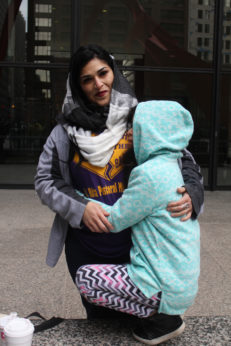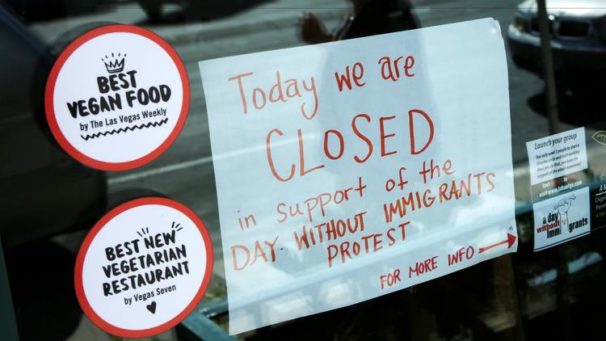
This article won Saul Miller Award – in the 2018 International Labor Communications Association’s Labor Media Awards. 
CHICAGO – Cecilia Garcia was nine-months-pregnant with her second child when her husband first got deported. They had met in 1996, instantly fell in love, and decided to start a family together. Two years later, while driving a car with a faulty taillight, he was pulled over by the police, and being undocumented, was unable to provide identification. This minor violation of the law triggered a sequence of events that would ultimately lead to his deportation, tearing their family apart.
Garcia is now a single caretaker for her five children. She, like so many other families of undocumented spouses, was present at the “Day Without an Immigrant” rally that took place in Chicago on Thursday. It was one of dozens of similar actions that took place across the United States. Community members, undocumented workers, and allies gathered at Union Park to protest the increasingly dangerous conditions that immigrants are facing under the Trump administration. Garcia was there with her youngest daughter. “I don’t want to let them believe that this is normal,” she said. “Because it isn’t okay, but this is a reality.”

The main protest was organized by Arise Chicago, a faith/labor action organization that partners with immigrants and leaders from the religious, government, legal, labor, and academic communities to end workplace abuse. A number of Chicago businesses followed suit and closed down for the day, standing in solidarity with their immigrant workers. Thousands descended on Union Park on Chicago’s Near West Side and marched all the way downtown to the Federal Plaza building. People raised their banners and shouted out chants of resistance.
Similar scenes have been playing out around the country in major cities with large immigrant populations , such as Los Angeles and Austin. On Monday, the grassroots collective Voces de la Frontera convened a march in Milwaukee, Wisconsin, in partnership with the Coalition for an Inclusive Wisconsin, Muslim community organizations, thousands of immigrant workers, business owners, and their families. Members of the community there organized the protest as a rapid response to Milwaukee County Sheriff David Clarke’s decision to enroll in ICE’s 287(g) program, named for a provision which grants local and state officers the authority to arrest and detain undocumented people as deputized immigration officials.
The announcement has left thousands in the Milwaukee area fearing for the safety of themselves and their families, including Alejandra Gonzalez, a volunteer and member of Voces de la Frontera. Gonzalez did not find out she was undocumented until she was 12 years old. Even then, however, she could not quite wrap her head around what that meant. Milwaukee had always been home to her; it was where she grew up and went to school her entire life. “I couldn’t imagine going to a completely new country, starting a new language, being in a new culture,” she said. “I have a life here.”
It wasn’t until she began discussing college options with her mother near the end of high school that she began to understand the barriers she would face as an undocumented individual in the U.S. She was heartbroken to learn that she would not be able to qualify for any financial aid or assistance for school. “It felt as though I suddenly had a lot of fear,” said Gonzalez about the realization of her status. “I knew once I graduated I wasn’t safe anymore.”
These stories are not uncommon among undocumented millennials. Several young undocumented individuals have “come out of the shadows” in recent years as part of a push to create more visibility around similar narratives. In 2012, the Deferred Action for Childhood Arrivals (DACA) policy was enacted under the Obama administration. It allowed for certain undocumented immigrants who entered the country as minors to receive a renewable two-year period of deferred action from deportation and eligibility for a work permit.

This created a sense of security for some of the younger generation in the undocumented community, Gonzalez being one of them. It was DACA’s enactment that allowed her to return back to school at the age of 28 and continue to advocate for other undocumented members of the community through her work in social advocacy. “I can’t sit on the sidelines anymore,” she said.
The lingering threat of deportation was an issue even during the Obama administration, however, with over 2.5 million individuals removed from the country during his tenure. Still, with DACA recipients now being detained across the country as part of ICE’s latest round of raids, it seems the country is setting a new precedent for fear among immigrant communities.
It is becoming even more difficult for people to be reunited with family members and make legal appeals on behalf of their loved ones. Many organizations are now warning undocumented individuals of the risk in exposing themselves through programs such as DACA or DAPA, a similar program for the undocumented parents of U.S.-born children. With the current limits on pathways to citizenship, families and loved ones remain separated.
“People ask me all the time, why not just move to Mexico?” said Garcia, who’s been fighting for over seven years to get her husband back in the U.S. “It’s the principle. Why do I have to conform to the system and expose myself to danger? This is my country. I’m not going anywhere.”
Garcia’s resilience is a reflection of the strength that the entire undocumented movement embodies. The “Day Without an Immigrant” actions that she and millions took part in Thursday highlight the degree to which the United States relies economically on undocumented labor. They also demonstrate the power that can be mobilized when communities are organized and stand together in an unflinching spirit of resistance.
Garcia, like so many others, has vowed to continue pushing for amnesty and further legislative change. Undocumented workers, community members, and allies are ready to put their lives on the line and demand that the safety and rights of immigrants – a key segment of this country’s workforce – be recognized. “Some people say it can never be done,” says Garcia of the pushback effort. “Just watch me do it.”










